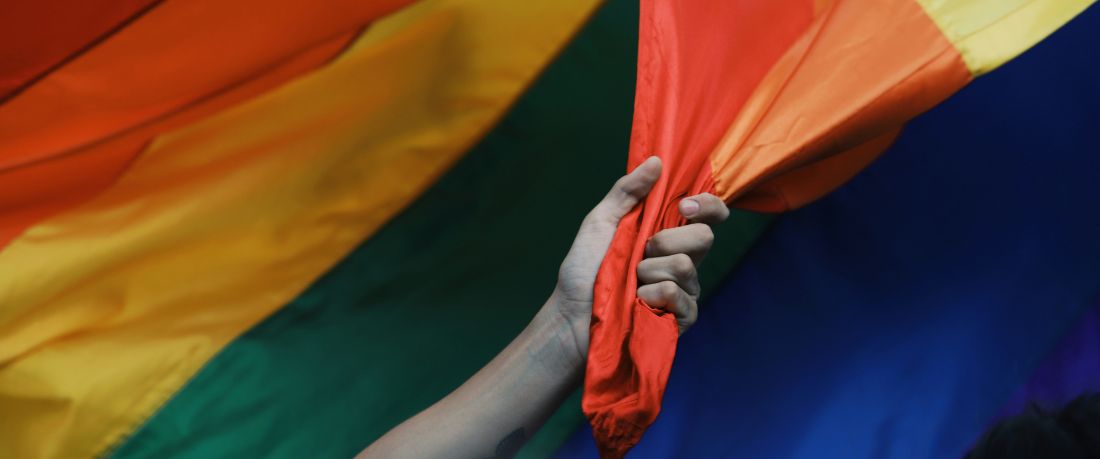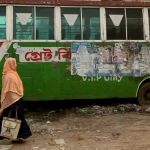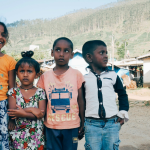In May 2023, Sri Lanka saw a petition filed before the Supreme Court seeking action against a Private Members Bill that seeks to decriminalise relations between LGBT+ individuals. This petition contains a number of misconceptions and perpetuates harmful myths about same-sex relations that are detrimental to the community. These myths have a negative impact on the rhetoric related to the LGBT+ community in Sri Lanka, and have the potential to cause panic and adverse responses from society.
As a response to this misinformation and to create awareness about the Private Members Bill, iProbono’s Sri Lanka team launched an online initiative in May 2023. This socio-legal awareness campaign, called ‘Demystifying Decriminalisation’, coincided with Pride month. The campaign was led by iProbono’s Advocacy Officer and Attorney at Law, Kaveesha Coswatte, who helped organise and moderate all the sessions.
Each session was designed to tackle one of the myths associated with the petition, and also to promote public discourse based on facts and expert inputs. Through a panel discussion, the campaign was also able to engage with around 120 people, including 50 law students.
The campaign featured a 3-part bilingual (English and Sinhala) X (formerly Twitter) Q&A series, where Human Rights, Child Rights and LGBT Rights experts engaged with the public. There was also a panel discussion with law students on legal reform, led by Kaveesha Coswatte. Bhoomi Harendran of the National Transgender Network was one of the panel speakers and shared real-life experiences of being a transgender woman in Sri Lanka.
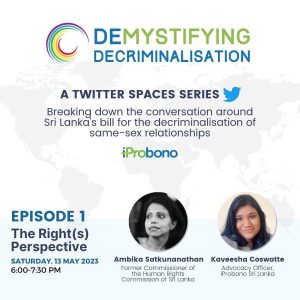 The Right(s) Perspective
The Right(s) Perspective
The series was kicked off by Ambika Sathkunanathan, a renowned human rights advocate, lawyer, and former Commissioner of Human Rights in Sri Lanka. She approached the issue from a human rights perspective, countering allegations that the decriminalisation process was an attempt to “normalise the abnormal”.
The session highlighted the flaws within Sri Lanka’s existing legal framework which often denies LGBT+ individuals the fundamental human rights all citizens are entitled to. Sathkunanathan laid out how the parliamentary process of legal reforms unfolds, and what potential outcomes it could take. Allowing the continuation of laws that criminalise sexual relations between consenting adults and deeming them unacceptable by society, she argued, is a tool of dehumanization and makes LGBT+ people feel like criminals. She strongly criticised the opposition to the much-needed legal reforms stating “This is not an LGBT issue, but a human rights issue!”
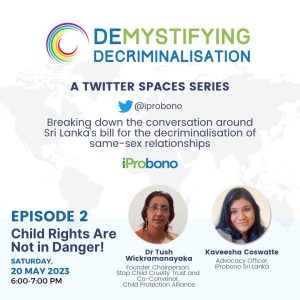 Child Rights Are Not in Danger
Child Rights Are Not in Danger
Dr Thushara Wickramanayaka, Chairperson, Stop Child Cruelty Trust, Co-Convenor of the Child Protection Alliance of Sri Lanka and a qualified family physician in Sri Lanka and the UK, led the second episode on the myths surrounding LGBT+ relations and child abuse cases. Dr Wickramanayaka emphasised that such allegations spread a false and dangerous narrative among the public. She also pointed out that the basis of these claims relies on irrelevant and outdated studies from western countries with limited credibility.
As evidence, she presented that in the last two years, 17 children have been murdered after extensive physical and sexual abuse in Sri Lanka. None of the perpetrators in these cases were homosexual.
Dr Wickramanayaka also clarified the definition of abuse in Sri Lanka, offering insights into recognizing the signs of child abuse, and practical approaches to combat it. She pointed out that there is no evidence to suggest that countries which have decriminalised homosexual relations have experienced a significant surge in child abuse. Moreover, individuals identifying as homosexual do not make up the majority of identified paedophiles in countries where homosexual relations are not criminalised.
Through this discussion, it was clear that the myth of LGBT+ persons preying on young children was incorrect. Moreover, the actual situation regarding child abuse in the country is of grave concern as the existing systems and laws are not being used effectively.
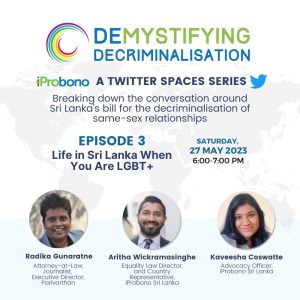 Life in Sri Lanka when you are LGBT+
Life in Sri Lanka when you are LGBT+
The final episode of the series featured Aritha Wickramasinghe, iProbono’s Equality Law Director and Country Representative for Sri Lanka, and Radhika Gunaratne, an Attorney-at-Law, veteran journalist, and LGBT+ rights advocate, as the speakers.
They discussed the challenges faced by LGBT+ individuals in society, sharing their personal experiences and professional insights.
Wickramasinghe used data to show that society is moving towards discarding outdated and oppressive laws, and that acceptance for LGBT+ people is increasing. This data debunks the myth that decriminalisation is against Sri Lanka’s traditional culture, values and societal fabric.
Gunaratne talked of how media reporting practices often overlook stories involving violence and harassment against LGBT+ individuals, and are more inclined to publish negative reporting that unintentionally reinforces the anti-LGBT+ narrative.
The audience posed questions on how they could support decriminalisation and be allies in the process. These inputs underscore the fact that there are a number of sensitive and informed individuals who are receptive to learning the truth about LGBT+ relations.
The finale of the series was an offline panel discussion, a collaborative effort between the Asia Pacific Institute of Information Technology (APIIT) Law School students and iProbono. The discussion on ‘Understanding LGBT+ From a Legal Perspective’ was led by iProbono’s Kaveesha Coswatte and Bhoomi Harendran, an award-winning actress and Executive Director, National Transgender Network participated in the event. She shared testimonies that shed light on the challenges faced by the transgender community in Sri Lanka, especially the violence they encounter at the hands of the police. There were discussions around cases and situations where clear violations of rights were seen and where justice remained elusive for the victims.
The audience of law students were enthusiastic in grappling with the legal concerns arising from the existing law and the human experiences therein. They also pointed out how the current law leaves the door open for unacceptable violations of a person’s rights, regardless of gender identity or sexual orientation.
The main goal of the ‘Demystifying Decriminalisation’ campaign was to encourage engagement of wider social networks with concrete facts and evidence, and present the lived stories of LGBT+ people to dispel harmful myths. The campaign served as a reflection of the increasing optimism for a society that will no longer treat LGBT+ persons as “others” but as fellow citizens and individuals who share the same rights. While this campaign was a much needed first step towards positive knowledge sharing on the road to decriminalisation, we remain committed to leading similar initiatives in the near future.
Kaveesha Coswatte – Advocacy Officer, Sri Lanka.

